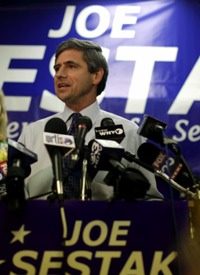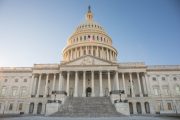
The main reason Rep. Darrell Issa (R-Calif.), the top Republican on the House Oversight Committee, is pressing the issue over Rep. Joe Sestak (D-Pa.) is owing to the reticence of the White House to be forthcoming about the matter. Most of the time, plausible deniability and the passage of time work well to make any potentially contentious or dangerous issue “go away.” But not this time.
Back in July of 2009, well before liberal Sestak (Freedom Index rating of 0) decided to make a run for Arlen Specter’s (D-Pa.) Senate seat in November of 2010, he was approached by someone from the Obama administration who asked him to back off. As incentive to leave Specter alone, Sestak said in an interview on Larry Kane’s Voice of Reason show in February this year, that the White House offered him a federal job. Here is that conversation:
Kane: “Were you ever offered a federal job to get out of this race?”
Sestak: “Yes.”
Kane: “Was it the Navy secretary?”
Sestak: “No comment. I would never get out [of the race] for a deal. I’m in this for the Democratic principles.”
Kane: “OK. But was there a job offered you by the White House?”
Sestak: “Yes.”
In a follow-up interview, Sestak refused to elaborate. “I’m not going to say who or how or what was offered. I don’t feel it’s appropriate to go beyond what I said.”
According to a “senior Pennsylvania Democrat,” Sestak’s admission “was met with anger by White House officials” when they heard about it. And well they might, as the White House had already promised support for Specter in exchange for his previous critical vote to pass Obama’s $787 billion stimulus bill. An expensive primary would also weaken the party’s response to a strong expected challenge by a Republican in November. In addition, Sestak’s campaign would leave his House seat open for someone with credentials that aren’t so liberal.
And liberal they certainly are. A graduate of the John F. Kennedy School of Government at Harvard University, with degrees in political economy and government, Sestak retired from the Navy as a three-star vice admiral. His career was effectively ended in 2005 when he was reassigned from his position at the office of Chief of Naval operations owing to a “poor command climate.” He won his House seat in Pennsylvania in 2007 and has since voted for nearly every piece of Democrat legislation ever proposed, including, but not limited to, his support for the stimulus bill, the Tax Extenders and Alternative Minimum Tax Relief Act of 2008, for "cap and trade" legislation, and for the “card check” bill. He has a 100-percent rating from NARAL (The National Association for the Repeal of Abortion Laws), and has publicly stated his support for Roe v. Wade. He has been endorsed by the Sierra Club, and has a 100-percent rating from the extreme-left anti-gun Brady Campaign to Prevent Gun Violence, and has earned a rating of “F” from the National Rifle Association. He supported Hillary Clinton in her run for the presidency, and when her campaign ended, Sestak supported Barack Obama.
Issa’s initial formal written request for information from the White House on this issue on March 10 was ignored, and then deflected. Reporters began asking White House Press Secretary Robert Biggs for more details ever since the initial interview. On February 23, Gibbs said he “had not looked into the matter.” On March 1, he said he “did not have anything additional on the matter.” On March 12, Gibbs said he “did not have any more information on it.” Finally, on March 16, Gibbs said: “Look, I’ve talked to several people in the White House, I’ve talked to people that have talked to others in the White House. I’m told that whatever conversations have been had are not problematic.”
Issa wrote a second letter asking Gibbs directly for information relating to the people he spoke with, that by “collecting evidence from witnesses” Gibbs is implying “that the White House is allowing its [own internal] communications staff to carry out investigative tasks ordinarily conducted by legal professionals in the Counsel’s office. Such slipshodness has all the makings of a coverup.” When questioned about the lack of clarity and transparency from the White House, Issa said, “I believe [that] not answering our questions when in fact they have [been] asked and [not] gotten them answered” meets the standard for a coverup. “The public has a right to know,” he added. “A Congressman has made an allegation that is likely a felony.” The deadline for a response to his committee’s second letter is April 5. In concluding his statement, Issa said, “I’m not going to let this issue go away … until it’s resolved.” And when Gibbs was questioned about Issa’s threat to call a special prosecutor, Gibbs demurred once again, saying he would say “nothing more than what I said last week.”
The “felony” referred to by Rep. Issa is covered in two statutes: the Hatch Act, and Title 18 of the U.S. Criminal Code. They both have teeth. The Hatch Act “forbids officials paid with federal funds from using promises of jobs, promotion, financial assistance, contracts, or any other benefit to coerce campaign contributions or political support.” Title 18 states that “Whoever solicits … any … thing of value, in consideration of the promise of support or use of influence in obtaining for any person any appointive office…shall be fined under this title or imprisoned not more than one year, or both.”
And so it’s little wonder that the response to Issa’s requests have been slow in coming. Mark Feldstein, professor of journalism at George Washington University, said, “The White House is certainly being cagey, and they’re handling it the same way that they handled it … when those folks snuck into the White House. They’re trying to clamp down the lid, keep it mum, and hope it goes away.”
The White House’s failure to respond gives skeptics and cynics more evidence and confirmation about how things get done behind closed doors. This time the White House may have stepped in "it” and might discover that ignoring "it" will not “make it go away.”
Photo of Representative Joe Stesak: AP Images

